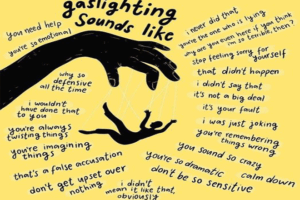
The word "Gaslighting" stems from Patrick Hamilton's 1938 drama "Angel Street," which was later adapted into Alfred Hitchcock's film "Gas Light." A manipulative husband tries to make his wife believe that she is losing her mind in the thriller film by making small alterations in her environment, such as gradually lowering the flame on a gaslight. He not only disrupts her environment and convinces her that she is insane, but he also abuses and controls her, isolating her from her family and friends.
Gaslighting is a common method of manipulation in abusive relationships. It's a sort of covert emotional abuse in which the bully or abuser deceives the target by fabricating a storey and making them doubt their judgments and reality. After a while, the victim of gaslighting begins to doubt their impressions of the world, sometimes questioning their sanity.
Gaslighting is most commonly seen in romantic relationships, although it can also happen in dominating friendships or among family members. People who gaslight others may suffer from mental illnesses like narcissistic personality disorder (NPD) or borderline personality disorder (BPD). They utilise this sort of emotional abuse to gain control over others, such as friends, family members, or co-workers
Gaslighters deceive others
Gaslighting can be perplexing, and it can make you doubt your judgement, memory, self-worth, and overall mental health. It may be beneficial to learn more about the strategies used by someone who is gaslighting you. Lying, diverting, minimising, denying, and accusing are some of the methods used in gaslighting. When dealing with someone who utilises gaslighting as a kind of manipulation, pay attention to what they do rather than what words they use.
They always tell lies
People who engage in gaslighting are typically chronic and pathological liars with narcissistic characteristics. Even when you call them out or present proof of their lying, they usually continue to lie and refuse to back down or amend their stories. "You're making stuff up," "That never happened," or "You're insane," they might say.
The cornerstones of gaslighting behaviour are lying and distortion. Even when you know they are lying, they may be extremely convincing. In the end, you begin to doubt yourself.
They always pull you down
People who gaslight you disseminate tales and gossip about you to their friends and acquaintances. They may act concerned about you while implying that you are emotionally unstable or "crazy" to others. Unfortunately, this method may be highly powerful, and many people will sympathise with the abuser or bully without fully understanding the situation. Furthermore, someone who participates in gaslighting may tell you that other people think the same thing about you. These people may never have said anything negative about you, but the person who is gaslighting you will make every effort to convince you that they did.
They always distract you
When you ask someone who gaslights a question or calls them out on something they did or said, they may change the subject by asking a question rather than replying to the problem. This not only throws you off, but it also makes you wonder why you should pursue a subject when they don't feel compelled to answer.
They misguide your thoughts and feelings
Gaslighting permits the individual who is gaslighting you to gain power over you by trivialising your emotions. "Calm down," "You're overreacting," or "Why are you so sensitive?" are examples of statements they might make. All of these remarks downplay how you're feeling or thinking while also implying that you're wrong. When you're dealing with someone who never acknowledges your feelings, thoughts, or views, you could start to doubt them. Furthermore, you could never feel acknowledged or understood, which can be alienating, humiliating, and difficult to deal with.
They put the blame on others
Another classic gaslighting approach is transferring blame. Every conversation you have is twisted to make you blame yourself for something that happened. Even when you try to talk about how the abuser's behaviour makes you feel, they can manipulate the topic such that you start to wonder if you're the one who's to blame for their poor behaviour. They might say, for example, that if you behaved differently, they wouldn't treat you the way they do.
They always use compassionate language
When confronted or questioned, a person who gaslights will often respond with warm and kind remarks to try to diffuse the issue.
They may remark something along the lines of, "You know how much I adore you." I would never intentionally harm you." These comments may be exactly what you want to hear, but they are untrue, especially if the same action is repeated. However, they may be sufficient to persuade you to let them off the hook, allowing them to avoid responsibility and repercussions for their harmful behaviour.
Common Symptoms of Gaslighting
Gaslighting can lead to anxiety, sadness, and other mental health issues, including addiction and suicidal thoughts. You may experience the following symptoms.
- You question your feelings and reality, attempting to persuade yourself that the treatment you are receiving is not as awful as it appears or that you are overly sensitive.
- You begin to doubt your own judgement and perceptions: You're hesitant to speak up or express your feelings. You've discovered that expressing your viewpoint typically makes you feel worse in the end, so you choose to remain silent.
- You're nervous and vulnerable: You frequently feel like you're "walking on eggshells" around your partner, friend, or family member. You're also tense and low on self-esteem.
- You feel isolated and powerless, sure that everyone around you thinks you're "weird," "crazy," or "unstable," just as the person gaslighting you claims. You'll feel stuck and alone as a result of this.
- You're dissatisfied with yourself and the person you've become: For example, you may feel weak and passive, despite the fact that you used to be stronger and more assertive.
- You're concerned that you're overly sensitive since the person says things like "I was just joking" or "you need thicker skin."
- You spend a lot of time apologising: You feel compelled to apologise for everything you do or who you are all of the time.
- You're self-conscious: You never feel like you're "good enough." You make an effort to meet others' expectations and requests, even if they are unjustified.
- You're doubtful of yourself: You regularly doubt your ability to recall specific things from the past. For fear of being wrong, you may have given up trying to share what you remember.
- You assume others are disappointed in you: You constantly apologise for what you do or who you are, assuming that you have disappointed others or made a mistake.
- You're curious as to what's wrong with you: if there's something essentially wrong with you. In other words, you are concerned that you are mentally ill.
- You have trouble making judgments because you doubt yourself: You'd prefer to delegate decision-making to your partner, a friend, or a family member than make them yourself.
What to do If you're being gaslighted
There are several things you may do to protect yourself if you are being gaslighted in a relationship. You can only avoid gaslighting if you fully comprehend what it is.
It's important to remember that gaslighting isn't about you. It's all about the gaslighter's need for power and control. The gaslighter is frequently an insecure individual. They need to feel superior in order to feel "equal." They need to believe they have the upper hand in order to feel protected. They don't have many alternative coping skills or strategies to deal with disagreements. That doesn't make the behaviour acceptable. However, knowing this may help you take it less personally while you consider whether or not to keep the relationship going.
You won't be able to change the gaslighter on your own. The only method gaslighters know to govern their surroundings is to engage in gaslighting behaviour. As a result, they are unlikely to respond to reasonable requests for change.
Consider whether the relationship is worth enduring continual attempts to undermine your self-esteem. Start seeking new employment if the gaslighter is your employer or supervisor. Consider how to establish some distance between you and the person if they are a family member or a friend. If it's a significant other, you'll almost certainly need to insist on a couple's counselling if you want to keep the relationship alive.
Create your own network of support. Other people in your life who can vouch for your actuality and worth are necessary. In order to maintain control, gaslighters frequently try to isolate their victims. They frequently tell their victims that they are the only person who truly loves and understands them, which further manipulates them. Don't fall for it. Spend time with family and friends. Talk to other people who saw what the gaslighter is questioning to see if your perceptions are correct.
Work on regaining your self-confidence. Regardless of the gaslighter's opinion, remind yourself that you are a loveable and capable person. Remind yourself of other times in your life when you felt grounded, sane, and generally good about yourself to help you regain perspective. If you recognise any of these indicators of gaslighting, you should get professional help as soon as possible.
You can learn how to make healthy choices and create boundaries with the person who participates in gaslighting through counselling. Finally, let us understand that Mindfulness is the key to solving such situations.














